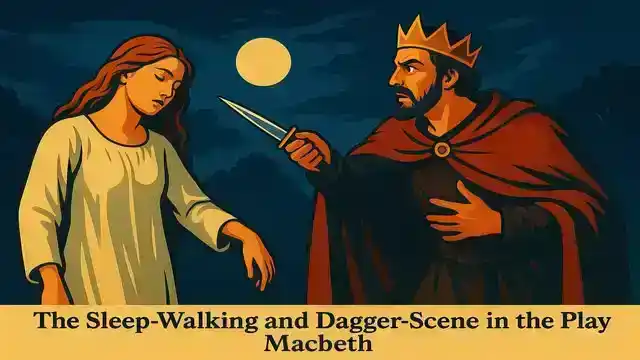The Sleep-Walking Scene:
The Doctor and Gentlewoman on Watch:
Both the scenes the sleep-walking and dagger-scene are very significant in the play Macbeth. In the sleep-walking scene, A doctor has kept watch for two nights with a waiting gentlewoman, that he may observe the fit of Lady Macbeth. The gentlewoman witnesses that she has seen her mistress rise from her bed, throw the dressing – gown upon her, unlock her closet, take out her paper, write something on it, read it, and at last return to bed.
Lady Macbeth’s Entrance and Actions:
All these details are supplied by the gentlewoman to the doctor, but she is not prepared to communicate to him all that her mistress had said in sleep-walking. Suddenly Lady Macbeth enters at this moment with a taper. They stand aside to observe her. She keeps rubbing her hands and cries: “Out damned spot! out, I say !” She seems to admonish her husband, and allude to a particular old man (i. e., Duncan) who has too much blood in him.
Obsession with Blood and Perfumes of Arabia:
She suddenly recalls that the Thane of Fife had a wife again looks at her hands which she imagines to be blood – stain ; wonders whether all the perfumes of Arabia will not sweeten them. With these dismal reflections she intermingles admonitions to her husband, sometimes bidding him wash his hands, put on his gown, and sometimes asking him not to worry about Banquo, and sometimes urging him to go to bed.
The Doctor’s Diagnosis and Advice:
Then she retires. The doctor declares that this disease is not one to be cured by him. He advises the gentlewoman to keep a sharp watch upon her and permit within her reach nothing with which she may do violence to herself.
Recollection of Past Incidents:
In the sleep – walking scene, Lady Macbeth recalls the past incidents particularly the murder of Duncan in connection with which she was so anxious that her husband should wash his hands and worry no more about the murder. Sometimes she would mix up with it her memory of the banquet scene. Here is the example:
“Wash your hands, put on your night – gown; look not so pale I tell you yet again; Banquo’s buried; he cannot come out one’s grave.”
The Nightmare of Macduff’s Wife:
Though she had nothing to do with the murder of Macduff’s wife and children, yet the incident crops in her nightmare:
“The thane of Fife had a wife where is she now?”
Lady Macbeth’s Tormented Mind
She looks at her hands and fancies; she sees blood on them and cries in vain- “Out, damned spot! out, I say !” She seems to be obsessed with it, and with her anxiety for her husband. The scene of Duncan’s murder, Macbeth’s unnervement at Banquo’s apparition, the fear and anxiety at the knocking after the murder of Duncan -all these come thronging back to her mind and she reacts them to her sleep – walking.
Dagger-Scene:
Importance of the Dagger-Scene:
The dagger – scene is a very important and significant be exaggerated. Besides showing the working of the supernatural powers, it reveals much of the mind of Macbeth. There is a close association between the supernatural powers and the working of Macbeth’s mind. The dagger is the objective representation of this association. In fact, the dagger is the projection of the black designs of Macbeth, though it has no physical existence.
Macbeth Encounters the Dagger:
Macbeth meets Banquo on his way to his bed – chamber a little after midnight. There is a brief talk between them. Then they part. Now Macbeth sends a servant to his wife to tell her to get the drink ready and to strike the bell when it is time. Suddenly there shoots up before his eyes the phantom of a dagger. As he tries to clutch at it, it moves away. He asks himself whether it is not a creation of his heat – oppressed brain. It points the way he is to go. He does not know whether he should doubt the evidence of his eyes, or of all his other senses. He begins to see even spots of blood on the phantom of dagger. His imagination, he feels, must have played this trick.
The Silence of Midnight:
He is solemnly impressed by the silence of midnight when bad dreams afflict the sleeper , when Witches celebrate the worship of Hecate and the graunt, spectre – like murderer stealthily moves towards his victim. Macbeth is afraid that his very foot – steps may awaken the stones and take away the awfulness of the hour. The bell strikes and he hurries on towards the chamber of the King.
A Dagger of the Mind:
The dagger is the creation of Macbeth’s imagination. But it may be noted that while Macbeth lets himself he runs away with his imagination, he realises that it is a dagger of the mind. “Is this a dagger which I see before me ….? Or art thou but A dagger of the mind, a false creation, proceeding from the heat – oppressed brain?”
The Power of Imagination:
Nevertheless the phantom of dagger has a very unsettling effect upon him. The point is that his fervid imagination, though it does not paralyse his reason, does certainly dominate him more than his reason. This perturbation of his mind on the eve of the murder, as we see, is due to the activity of his imagination; and we can easily conceive the revulsion of feeling which follows the murder; that again has its source in his imagination.
The Witches’ Possible Role:
Sometimes it is also argued that the dagger is an instrument and incentive used by the Witches. When the opportunity offers itself, Macbeth shows moral weakness – how can he kill his guest? By their supernatural powers, the Witches must have noticed Macbeth faltering in the execution of their black design, and to impel him to the execution of the deed, they presented an apparition of the dagger pointing towards the bad – chamber of Duncan, Macbeth understands its intention:
Thou marshall’st me the way that I was going,
And such an instrument I was to use.




